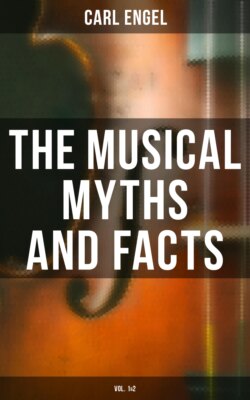Читать книгу The Musical Myths and Facts (Vol. 1&2) - Engel Carl - Страница 16
На сайте Литреса книга снята с продажи.
THE WILD HUNTSMAN.
ОглавлениеTable of Contents
The Wild Huntsman tears through the forest at night attended by a noisy host, pursuing his furious chase with unearthly singing, with sounding of horns, with the barking of dogs, the clattering of horses, and with fearful shouting and hallooing. This widespread conception has been ascertained to date from ancient pagan time, in which Wuotan, (or Woden), the principal deity of German mythology, exhibits the characteristics commonly attributed to the Wild Huntsman. But it is new as well as old; for it suggests itself not less naturally at the present day than it suggested itself in bygone times—as the reader will perhaps know from his own experience, if he has ever found himself alone on a stormy moonlight night in a forest of Bohemia or Germany. In any case, he may be sure that it is no joke to traverse in such a night a forest which still continues in almost its primeval state.
For awhile everything appears silent as the grave, and the lonely pedestrian, pursuing some old track which faintly indicates the way to a village, is only occasionally bewildered by the sudden darkness occurring when a cloud obscures the moon, or by the startling brightness, should he reach unexpectedly a clearing in the forest just at the moment when a cloud has passed across the moon, casting not far before him its shadow, which like a spectre rapidly flits over the brushwood, assuming various uncouth shapes. Soon his imagination is excited by distant sounds never heard in open day—yelping of foxes, howling of wolves, grunting of wild boars; and now by the piteous cry of agony emitted by a bird which has fallen a prey to some ravenous beast. Presently he is startled by an awful noise like the galloping of a cavalcade: a herd of stags is hastily fleeing through the wood. The cavalcade seems to come straight upon him; but soon the noise grows weaker, and quickly dies away. Now a whirlwind sweeping over the forest, and violently shaking the tops of the trees, gradually approaches the harassed pedestrian. At first only groaning and grumbling, it soon bursts forth into a terrific howl; and as it furiously passes over the head of the involuntary witness, it scares from their hiding-places sundry owls, the hooting and screeching of which alone would suffice to make his hair stand on end. And when the whirlwind has swept over, and is only heard faintly murmuring in the distance, other sounds and apparitions not less terrifying are sure soon to arise. In short, the lonely wanderer, be he ever so intelligent an observer of nature, will most likely feel his heart eased of a heavy weight when he has left the forest behind him. Soon, having reached the end of his journey, he may put on his slippers with that comfortable sensation of relief which people are sure to experience when they have escaped an imminent danger. It is all very well for him now to persuade himself that, after all, he has only witnessed some interesting natural phenomena; he may perhaps even smile at the superstitious notions of simple-minded peasants. But of what avail is this to him? The night is not yet over, and he cannot escape a fearful dream of a personal encounter with the Wild Huntsman and his furious host.
From what has been said it will not surprise the reader that the reports of witnesses who profess to have met with the Wild Huntsman are at variance in many points. Much evidently depends upon the nature of the locality in which the mysterious apparition shows itself. In some parts of Germany particular stress is laid upon the softness and sweetness of his music. This conception may have originated in the pine-forests where the delicate needle-shaped leaves of the trees are vibrated by the wind like the strings of an Æolian harp. But, the blowing of the huntsman's horn seems to be an indispensable attribute to the furious chase. The country-folks in Mecklenburg, and in some other provinces in the North of Germany where Low German is spoken, on hearing the mysterious noise in the wood, say, "De Wode tüt!" ("Woden is tooting!") thereby implying a series of unrhythmical sounds rather than a melodious succession of tones on the horn—in fact, sounds very much like the hooting of the owl. It is moreover a common belief that a kind of owl, called by the peasants Tutosel, always accompanies the Wild Huntsman with his furious host.
An account of an extraordinary occurrence given by an honest witness is, of course, generally preferable to a statement of the same occurrence merely obtained from hearsay; and the evidence of the witness deserves all the greater attention if he shows himself to be an intelligent and keen observer. The subjoined report of the German Baron Reibnitz may therefore interest the reader. It was communicated by the Baron to the Philosophical Society in Görlitz, Silesia. As Görlitz possesses a Philosophical Society, there must be clever fellows in the town. Be this as it may, the document is authentic, and has been faithfully translated from the German.
